Tbilisi’s house price rises continue, buoyed by strong demand and limited supply
Georgia’s housing market remains robust, buoyed by the country’s strong economic growth and booming tourism.
During the year to Q1 2019, the average sales price of apartments in Tbilisi, Georgia’s capital, rose by 7.1% to GEL 2,351 (US$881), following y-o-y rises of 12.4% in Q4 2018, 16.6% in Q3 and 6.6% in Q2, according to the ISET Policy Institute. When adjusted for inflation, prices in the capital city rose by 3.9% y-o-y in Q1 2019.
All districts registered positive y-o-y price growth. Samgori saw the biggest price increase of 24% during the year to Q1 2019, followed by Krtsanisi (16%), Chughureti (15.1%), Gldani (14.1%), Didube (13.4%), and Isani (12.1%). Strong price rises were also recorded in Nadzaladevi (10.1%), Saburtalo (10%), Mtatsminda (7.5%), and Vake (6.7%).
Mtatsminda remains the most expensive district in Tbilisi, with an average price of GEL 2,880 (US$ 1,079) per sq. m. in Q1 2019, followed by Vake (GEL2,646 or US$992 per sq. m.), Krtsanisi (GEL2,392 or US$897 per sq. m.) and Saburtalo (GEL2,390 or US$896 per sq. m.), according to ISET Policy Institute. In contrast, Gldani has the cheapest housing, with an average sq. m. price of GEL 1,560 (US$585).
Overall, TBC Capital expects real estate prices to continue rising in the coming years, amidst strong demand and declining construction activity.
“I would also like to mention the undeniable increase in consumer purchase power, which is expected to have a very positive effect on both real estate and the banking sector,” said Giorgi Tkhelidze of TBC Bank.
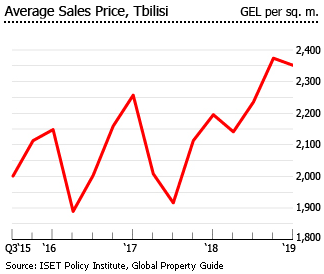
In 2018, Georgia’s economy expanded by a robust 4.7%, following growth of 4.8% in 2017, 2.8% in 2016, 2.9% in 2015, 4.6% in 2014 and 3.4% in 2013, according to the International Monetary Fund (IMF). NBG Governor Koba Gvenetadze expects the economy to expand by 4.5% this year, lower than the earlier growth forecast of at least 5%, mainly due to the dispute with neighboring Russia and political volatility caused by several public protests both in 2018 and 2019.
Foreigners can buy both residential and commercial real estate in Georgia, but cannot own agricultural land.
Sales transactions surging
During 2018, there were about 34,591 apartments sold in Tbilisi with a total value of GEL 4.1 billion (US$ 1.61 billion), up 31% from a year ago. Almost two-thirds of the total sales were for newly built apartments, according to research conducted by TBC Capital.
- For existing apartments, total amount sales value increased 23.5% to GEL 1.42 billion (US$ 0.56 billion) in 2018 from a year earlier.
- For new apartments, total sales value rose by 50.3% to GEL 2.66 billion (US$ 1.05 billion) over the same period.
Including other property types, there were about 53,414 sales transactions in Tbilisi last year, up 34.2% from the prior year, according to ISET Policy Institute. Nationwide, total property sales rose by 24% y-o-y to 122,247 in 2018.
“The year 2018 showed an increase in demand for premium and average houses. In the city centre a significant portion of demand was for houses with a large surface area, whereas demand in the outskirts was dominated by relatively smaller houses,” noted a report by The Financial.
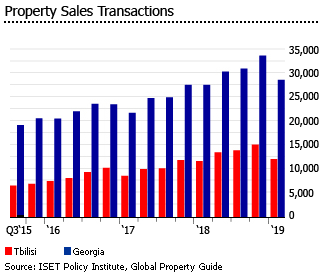
In Q1 2019, property sales in Georgia rose further by 3.7% y-o-y to 28,502 units, based on figures from ISET Policy Institute. Tbilisi continues to dominate the market in Q1 2019 with 41.8% share, followed by Kakheti and Adjara, with 12.6% and 10.9% shares, respectively.
Construction activity falling
Residential construction activity in Georgia is now declining, amidst increasing construction costs and tighter regulations on the issuance of permits.
In 2018, construction permits issued plummeted by 47% to just 550,000 sq. m. from a year earlier. This drop in permits is expected to be felt in the next three years.
Likewise, the supply of residential buildings fell by 5.8% to 591 in 2018 from a year earlier, according to ISET Policy Institute. The total area of residential buildings also dropped 5% y-o-y to 792,600 sq. m. last year.
Several large construction developments are planned in the next few years, including the three-tower Alliance apartment complex on Tamarishvili St., the Tbilisi Hilton on Kostava Avenue, the City Mall near Vazha Pshavela metro, and the Wyndham Garden Hotel on Tamarishvili St., among others.
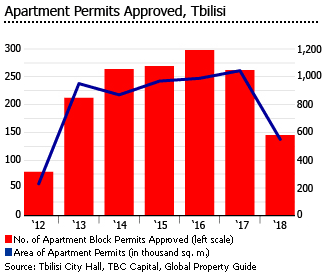
The construction sector in Tbilisi, is expected to remain weaken in after a restriction of increases in the K2 coefficient in central and historic party of the city by the Tblisi government. The K2 construction intensity coefficient is the ratio of the overall area of the floors of a building on a given plot of land to the overall area of the plot. By paying a certain fee the construction company could previously add to the number of floors of a building. This practice has now been partly curbed. On March 2019, the city implemented the Land Use Master Plan, which effectively limits developers and may possibly reduce building areas, according to TBC Capital.
Moreover, regulations to ensure the quality of construction materials are also expected to increase the overall costs of real estate developers.
In Tbilisi, the total apartment stock stood around 290,000 units by early-2019, with 21.64 million sq. m. of livable area, according to TBC Capital. However, the city’s housing stock is already relatively old, with around 81% of the total built before 1991. Tbilisi has currently a homeownership rate of about 92%, one of the highest in the Commonwealth of Independent States (CIS) and the European Union.
Mortgage rates falling for GEL-denominated loans; rising for foreign currency loans
In August 2019, the average interest rate on GEL-denominated mortgage loans was 8.74%, sharply down from 12.49% a year earlier, according to the National Bank of Georgia (NBG).
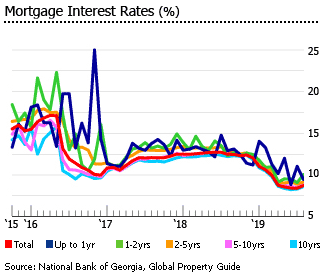
By maturity, in August 2019:
- Up to 1 year: 9.46%, down from 12.92% a year earlier
- 1-2 years: 10.06%, down from 12.3% a year ago
- 2-5 years: 9.18%, down from 12.96% a year ago
- 5-10 years: 8.81%, down from 12.57% a year earlier
- More than 10 years: 8.62%, down from 12.21% a year earlier
In contrast, the average interest rate for foreign currency-denominated mortgage loans stood at 6.28% in August 2019, up from 5.11% in August 2018, based on figures from the central bank.
Foreign currency-denominated loans, August 2019:
- Up to 1 year: 24%, sharply up from 6.38% a year earlier
- 1-2 years: 6.42% in July 2019, up from 5.61% a year ago
- 2-5 years: 7.07%, up from 5.78% a year ago
- 5-10 years: 6.2%, up from 5.05% a year earlier
- More than 10 years: 6.26%, up from 5.09% a year earlier
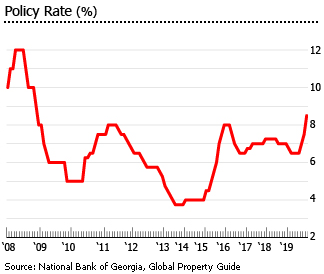
The NBG raised its policy interest rate by 100 basis points in October 2019 to 8.5%, the highest level since November 2008, in an effort to tame inflation. Nationwide inflation reached 6.4% in September 2019 - far above the central bank’s inflation target of 3%. This was mainly due to weakening of the domestic currency and higher tobacco excise taxes.
Mortgage market growing rapidly
From 2015 to 2018, the total amount of mortgage loan outstanding surged by an annual average of 32%. As percent of GDP, the size of the market expanded from 8.1% in 2015 to 14.3% in 2018, based on Global Property Guide estimates.
The strong growth continued this year despite the introduction of new regulations that restrict banks to issue mortgage loans based on the borrower’s income and that the maximum term period should not exceed 15 years.
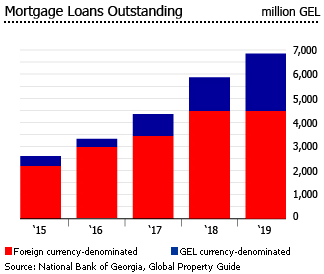
In September 2019:
- GEL-denominated mortgage loans outstanding surged 82.9% y-o-y to GEL 2.38 billion (US$806.85 million), according to the National Bank of Georgia
- Foreign-currency denominated mortgage loans outstanding rose by 8.8% y-o-y to GEL 4.46 billion (US$ 1.51 billion).
The income group categories based on the new bank regulation, effective January 2019:
- Up to GEL 1,000 (US$340) income per month: loan with monthly payments that do not exceed 35% of income or GEL 350 (US$119)
- GEL 1,000 (US$340) to GEL 2,000 (US$679) income per month: monthly payments do not exceed 45% of income or GEL 900 (US$306)
- GEL 2,000 (US$679) to GEL 4,000 (US$1,358) income per month: monthly payments do not exceed 55% of income or GEL 2,200 (US$747)
- More than GEL 4,000 (US$1,358) income per month: loan with monthly payments which do not exceed 60% of income
High rental yields
In 2018, rental yields stood at 9.3%, slightly down from 9.4% a year earlier, based on figures from TBC Capital.
“The rental yields have been stable throughout 2018, revolving around the mean of 9.3%,” said TBC Capital. “The yields have historically been higher than deposit rates as well as foreign currency mortgage rates, making apartments an attractive income yielding asset.”
During 2018, the average monthly rent for an apartment rose by 1.6% y-o-y to US$ 5.34 per sq. m., according to TBC Capital.
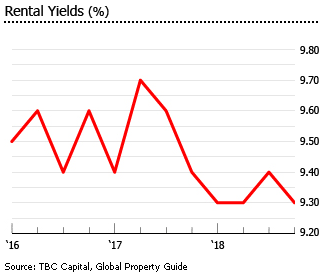
Strong growth was seen in short-term rental accommodation. In 2018, about 8,660 and 5,331 new offers in Tbilisi were placed in Airbnb and Booking.com.
With booming tourism, Tbilisi’s housing rental market, particularly the short-term segment, is expected to remain robust next year.
Booming tourism
In 2018, there were about 8.7 million visitor arrivals in Georgia, up 9.8% from a year earlier, according to the Georgian National Tourism Administration (GNTA). The largest number of visitors came from Russia and Azerbaijan, which accounted for 20.9% and 19.8% of total arrivals, respectively.
Likewise, visitor expenditures surged 37.4% y-o-y to GEL 7.9 billion (US$ 2.7 billion) in 2018.
Georgia’s tourism sector has been growing by almost 13% annually in the past decade.
Visitor arrivals continue to increase this year, despite the Russian government’s recent decision to impose a complete flight ban on Georgia. During the first seven months of 2019, tourist arrivals in the country rose by 8% y-o-y to around 2.7 million people. In fact, Russian tourists travelling to Georgia increased 22% over the same period.
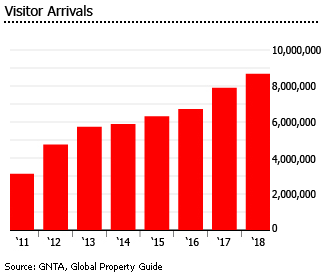
In July 8, 2019, Russian president Vladimir Putin imposed a flight ban to Georgia, following protests in Tbilisi aimed against Russia’s occupation of Abkhazia and Tskhinvali, Georgia’s breakaway territories.
Tourism accounts for around 72% of service exports in the country’s balance of payments. As of 2018, tourism revenues represent about 36% of total exports.
Strong economic growth, falling unemployment
In 2018, Georgia’s economy expanded by a robust 4.7%, following growth of 4.8% in 2017, 2.8% in 2016, 2.9% in 2015, 4.6% in 2014 and 3.4% in 2013, according to the IMF. Then in the first eight months of 2019, the economy grew further by 5%, slightly up from a 4.8% expansion in the same period last year.
Despite this, NBG Governor Koba Gvenetadze expects the economy to actually expand by 4.5% this year, lower than the earlier growth forecast of at least 5%, mainly due to the dispute with neighboring Russia and several anti-government protests since last year.
Standard & Poor’s upgraded Georgia’s long-term foreign and local currency sovereign credit ratings from “BB-” to “BB” in October 2019, with a stable economic outlook, following a similar upgrade by Fitch Ratings in February 2019.
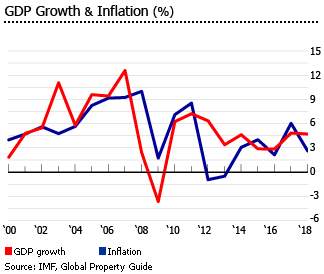
According to the ratings agency, Georgia still managed to grow strongly in recent months despite volatile external and internal political environment. “This resilience partly reflects the economy’s success in attracting funds from abroad to finance its investment needs and its external deficits,” said S&P.
Nationwide unemployment fell to 12.7% in 2018, down from 13.9% in 2017 and the lowest level in 15 years, based on figures from the National Statistics Office of Georgia (Geostat). The jobless rate declined further to 12% in the first half of 2019.
The total number of unemployed also dropped 11.1% y-o-y to 245,700 people last year.
Sources:
- Real Estate Market Highlights, #13 | January-March 2019 (ISET Policy Institute): http://iset-pi.ge/index.php/en/real-estate-prices-index
- Research by TBC Capital Estimates Tbilisi’s Real Estate Market Volume at GEL 4.1 Billion (The Financial): https://www.finchannel.com/business/banksandservices/77163-research-by-tbc-capital-estimates-tbilisi-s-real-estate-market-volume-at-gel-4-1-billion
- Real estate prices will continue to grow in Tbilisi – market research (Jam News): https://jam-news.net/real-estate-prices-will-continue-to-grow-in-tbilisi-market-research/
- World Economic Outlook Database (International Monetary Fund): https://www.imf.org/external/pubs/ft/weo/2019/02/weodata/index.aspx
- Statement from the Mayor of Tbilisi (Tbilisi City Hall): http://tbilisi.gov.ge/news/6988?lang=en
- Residential Real Estate Sector Analysis April 2019 (TBC Capital): https://www.tbcresearch.ge/en/Research/Download?ResearchId=157&Type=PDF
- National Bank of Georgia increases refinancing rate to 8.5% (Agenda.ge): https://www.agenda.ge/en/news/2019/2849
- Eight million tourists visited Georgia in 2018 (Agenda.ge): https://agenda.ge/en/news/2019/436
- Georgian tourist numbers continue to grow despite Russian flight ban (Emerging Europe): https://emerging-europe.com/news/georgian-tourist-numbers-continue-to-grow-despite-russian-flight-ban/
- Georgia´s economic growth expands 5% year-on-year in Jan-Aug (Reuters): https://www.reuters.com/article/georgia-economy/georgias-economic-growth-expands-5-year-on-year-in-jan-aug-idUSL5N26L580
- World Bank report surveys Georgian economy in 2019, coming years (Agenda.ge): https://www.agenda.ge/en/news/2019/2739
- Georgian Real Estate Development Market Trends (Georgia Today): http://georgiatoday.ge/news/15514/Georgian-Real-Estate-Development-Market-Trends
- Employment and Unemployment (National Statistics Office of Georgia): https://www.geostat.ge/en/modules/categories/38/employment-and-unemployment
- S&P upgrades Georgia’s credit ratings (Emerging Europe): https://emerging-europe.com/news/sp-upgrades-georgias-credit-ratings/